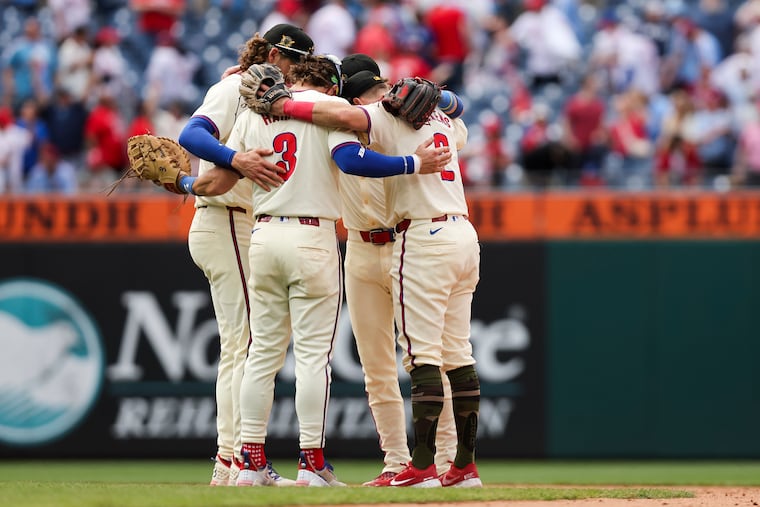The Phillies are showing us that it shouldn’t have to be hard to say ‘I love you’
The team's refreshingly open displays of affection, care, and respect are atypical in the hypermasculine world of sports — and may contain lessons for us all.

I grew up playing catch with my older brother, Ryan, in a cramped alleyway behind our multifamily home in Roebling, N.J., where the air was tinged with the ever-present aroma of stacked trash. Oddly, the smell never bothered me. My imagination was elsewhere envisioning a career with the Phillies. But as fate would have it, baseball was not my sport. Instead, my calling was at the keyboard, describing events as a writer and poet rather than participating in them.
Not long ago, I found myself driving back to my childhood home — a strong desire to play catch again had washed over me. As I sifted through the clutter in search of my old Rawlings leather glove, I realized this current Phillies team, with their electrifying wins and undeniable charm, has rekindled a childlike joy within me and many others around Philadelphia. They’ve brought us back to the simplicity and pure happiness of a game of catch, making us fall in love with the sport all over again.
In the Phillies’ clubhouse, there’s a different vibe — one that’s rare in the often cutthroat world inhabited by professional athletes. Baseball, though less violent than other sports, still demands fierce competition. Yet, within this backdrop, the Phillies players openly express their love and respect for one another, forming bonds that transcend the usual team dynamics. This openness is particularly striking in a society where a mental health crisis looms large, especially among men who often suffer in silence.
It’s refreshing and deeply moving to hear players like Bryce Harper, Alec Bohm, Trea Turner, and Bryson Stott describe the brotherly affection that knits their team together.
Phillies pitcher Jeff Hoffman praised the team, noting, “This is a big group from a lot of different places, and it feels like a family. We get close quickly, and it’s a testament to the culture that they’ve built here.”
Manager Rob Thomson echoed this sentiment during the team’s recent trip to London, observing how the players “kind of love each other and they get along so well.” This camaraderie, both lighthearted and heartfelt, is playfully manifested in their exchanges of friendship necklaces and affectionate double cheek kisses.
During All-Star weekend, the Phillies showed up in force to root for Bohm at the home run derby. Harper, always the team player, was right there, handing Bohm “wooder” to keep him hydrated through the swings.
Brandon Marsh captured the essence of their unity: “It’s just a good mixture, and everyone loves each other here. We’re all united, we’re all fighting for the same goal, so it’s a pretty cool feeling.”
The Phillies are doing more than just winning games; they are winning hearts by being fully themselves.
Their open displays of affection, care, and respect are atypical in the hypermasculine world of sports — and may contain a lesson for us all about the importance of goodwill, compassion, and positive feedback in team success.
That spirit of love and support is just one of the things that makes the Phillies special, and it’s probably a big reason why their recent run has resonated so deeply with fans.
Reflecting on those days playing catch in the alleyway in Roebling, I realize it wasn’t just about the game. It was about the connection, the joy, and the simple, pure expression of who we were. The Phillies are bringing that back, not just for me, but for the entire city of Philadelphia. They’re showing us a better way.
In a world where masculinity often makes headlines for all the wrong reasons, the Phillies’ locker room is a refreshing anomaly. The players’ unity is a tender thread, stitching together the fabric of their team, and reminding us that strength can be forged in the most unlikely of places: vulnerability.
Their clubhouse stands in stark contrast to the discord that surrounds us, a testament to the power of empathy and support even in the most competitive of arenas. I’m grateful to the Phillies for whisking me back to those days when I would eagerly slide my glove on, just to play catch with my brother — for the sheer joy of it.
Kyle Hulehan lives in Roebling.